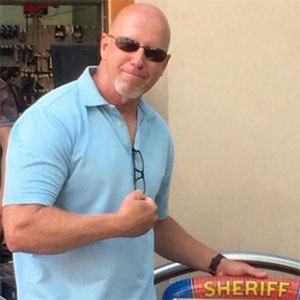
If you don’t know what the hardest part of a sexual assault investigator’s job is, I’ll tell you: It’s when your heart and mind agree that the little girl or boy is telling the truth, but you can’t make the case, so you have to put the kid back into the home. Usually it’s a dysfunctional environment where, because of their absence, disbelief or more, even the so-called “innocent” custodians are functionally complicit. But thanks to a disciplined skill that my dad taught me, I had the best way to move on from these situations. It’s helped me a lot over the years, and it still does. I even used it once to beat a world-record-holding sprinter in a footrace, and I’ll share it with you.
Ah, I remember it well. Over the course of the academy, we had four timed mile-and-a-half runs. Not only did you have to make a particular time, but the expectation was to continually improve. So the real competition wasn’t so much between us cadets; it was a contest you had with yourself.
Although it makes little sense, fitness training is much like the rest of life: We mostly like to focus on what we’re already good at, and for me, that was weights. I set the pushup record for my academy, so running was not my strong suit. Still, as those slender cadets were putting distance on me out on the track, I remember getting some joy by asking them just what they planned on doing with a yoked-up parolee once they caught the guy. But back to my story.
For my first of the four timed runs, I posted a respectable but not spectacular time, a bit under 10 minutes. I continued to train hard, and the second time was better, somewhere in the mid-nines. On the third timed run, I set a new personal best of nine minutes flat. But I still wasn’t in first.
I put myself through the academy and worked while doing so, so there wasn’t much extra time to train. Yet when you put your mind to it, you’d be surprised what you can accomplish. So in the words of Forrest Gump, “like the wind blows, from that day on, if I was ever going somewhere, I was running.”
Finally, my big day came: the last timed run, and I was ready for it. I would soon find out just what terminal velocity for my 185-pound frame was. Resolute, I left nothing in reserve, crossing the finish line with not another stride in me. That storied run remains a source of pride.
Flash forward: It was the 2008 Olympic Summer Games, and sprinter-phenom Usain Bolt of Jamaica was the talk of the sporting world. There were palpable expectations of what new records he might achieve. Yet, for all the hype, his 100-meter performance was, at least to me, a bit of a disappointment.
It all started great. He got out of the blocks superbly. Like a thoroughbred, his long, sinewy muscles rhythmically rippled with each gait, and he quickly sped to the front. Then, gazing at his adoring fans with about 10 meters to go, he throttled back.
The crowd cheered. Bolt took first place and even set a new world record. The papers, magazines and sportscasts all called it a spectacular, shocking and elite feat.
Next to my computer sits an old Webster’s pocket dictionary. I bought it for the police academy when I was 19 and I carried it in my patrol car for many years. The cover wore off a long time ago, and when I thumb its pages under my nose it gives off that comfortable, old-book smell. In it, I find the word “elite” to mean “the best, most powerful, etc.”
When my academy fitness instructor stopped his timer, to my great disappointment, it once again read 9:00. I didn’t get into the eights like I so badly wanted. It turns out that nine minutes even was a threshold I couldn’t break.
But remember who I was really competing against. Unlike Bolt, my results were “the best, most powerful” performance I could give. That’s how I beat him, and that’s how, throughout a long career marked by many sacred trusts to defend the vulnerable, I was more able to live with the results, regardless.
When I was a boy, my dad frequently sat me down to share his wisdom. The number-one thing he seared into me was that when things really counted, we should do our absolute best. Then, you can live with yourself forever.
I won’t lie. Sometimes I think about the kids I had to give back over to terrible people. It still bothers me, but not as much as it could have. They all deserved my best and they got it.
So here’s my ask: Through chance, fate or more, you are going to be put into situations where your performance will be the only hope for deserving people to have a much better life. Regardless of what may come of it, for their sakes and yours, give it your disciplined best.
That’s what makes you a winner.
Editor’s note: This article originally appeared in the July 2019 issue of PORAC Law Enforcement News, the official publication of the Peace Officers Research Association of California.
As seen in the May 2021 issue of American Police Beat magazine.
Don’t miss out on another issue today! Click below:






